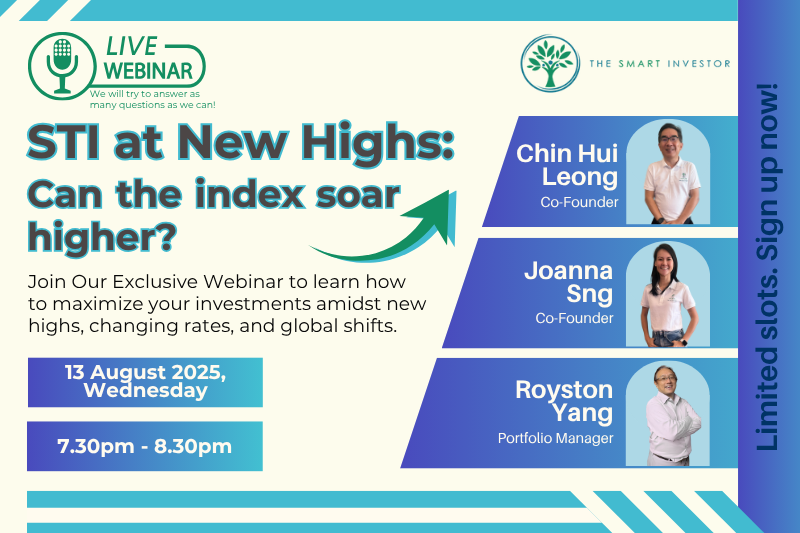On the surface, investing may look deceptively simple.
All you need to do is find a great company to invest in, and then allocate your money to it.
However, many investors either overlook or underestimate the impact of psychology on their investments.
Emotions such as greed and fear can scuttle even the best-laid investment plans and cause your investments to go awry.
If you strive to become a better investor, here are four psychological pitfalls you need to avoid.
Hindsight Bias
Hindsight bias describes a situation where investors tend to perceive past events as having been accurately predicted.
This mindset often leads to overconfidence in investors’ predictive abilities and may result in rash or wrong decisions being made.
This bias occurs when an investor predicts a future event and then convinces himself that he got it right when the event does occur.
Remember that even if the event did occur, it may have been due to reasons that were different from the original forecast or because of a new set of reasons unrelated to what was expected.
A good example is interest rate movements.
Predictions on whether interest rates will be cut or held steady could involve a set of assumptions, but the reality could be far more nuanced.
Investors who believed that they got it right will then be tempted to make further predictions as they are convinced of their forecasting ability.
When it comes to buying and selling, investors may execute certain decisions with the mistaken mindset that they can predict share price movements, thus leading to poor decisions and mounting losses.
The solution to this bias is to keep an accurate and honest journal of your buy and sell decisions.
By checking on them after an event occurs, you can then determine if you indeed have good forecasting ability or have fallen prey to hindsight bias.
Confirmation Bias
Confirmation bias is the tendency for investors to search for information that confirms their existing beliefs and to reject information that is contrary to these beliefs.
The reason why the brain does this is simple – doing so helps to promote self-esteem and also reduces stress from conflicts or differences in opinion.
Confirmation bias is very pervasive when an investor wishes to convince himself as to why he should invest in a company.
He tends to seek out information that reinforces his positive perception of the business and to reject any information or data that is negative.
Doing so is, of course, dangerous because you may develop a flawed assessment of the merits of a business and blatantly ignore the risks associated with it.
The good news is that it’s not difficult to counteract confirmation bias, though it does require willpower.
You need to actively seek out information that contradicts your view to obtain a balanced set of opinions on a stock.
By objectively weighing the pros and cons, you can make a more informed investment decision.
Overconfidence
Overconfidence makes investors overestimate their skill and knowledge, usually to their detriment.
This psychological bias can result not only in poor financial decision-making but also in a host of other problems.
An overconfident investor could end up trading excessively, thinking that he can accurately predict price swings.
As a result, he may incur significant brokerage fees while nursing losses from poor trades.
Overconfident investors also take excessive risks as they are too confident in their abilities, and many may fail to diversify.
Concentrating too much of your funds in just a few stocks is a foolhardy move, but overconfident investors believe that they are maximising their chance at outsized profits.
Recognising overconfidence is often the first step towards correcting this behaviour.
Next, you have to correct this behaviour by objectively reviewing your investment decisions and being honest with your flaws.
Recognise that humans make mistakes, and that it’s more prudent to diversify your investments.
With practice and over time, an overconfident investor can learn to be less reckless and be more calculated when approaching the markets.
Recency Bias
Recency bias is a tendency for investors to overweigh recent information without assessing the objective probability of such events occurring.
An example may be the outbreak of the COVID-19 pandemic, which caused a sharp crash in share prices.
Investors could be so scarred by the experience that they believe a crash is always imminent, even though pandemics happen rarely.
Recency bias also applies to bubbles and bear markets, with investors believing that such events are more frequent than they actually are.
As a result, these investors may buy and sell their shares at the wrong time.
This bias is tough to overcome because recent events do indeed tend to be fresh in our minds compared with a more distant event.
The best method to combat recency bias is to put in place a sturdy, long-term investment process and stick with it through volatility.
By adhering to your process and planning how and when you should rebalance your portfolio, you are unlikely to react to the quick whims of the stock market and make poor judgement.
Wish you could overhear how experienced investors think? That’s what Get Smart feels like. Reading calm, thoughtful commentary from people who study the markets closely and care about growing wealth sensibly. Click here to subscribe to our weekly newsletter for free now!
Follow us on Facebook, Instagram and Telegram for the latest investing news and analyses!






